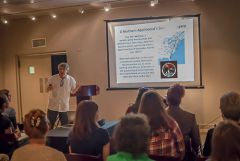
How did Maitland’s Lewis Lawrence (1806-1886), a wealthy white businessman and philanthropist from upstate New York, become friend and patron to the historic black township of Eatonville, Florida (est. 1887)? What motivated Lawrence, in the social and political context of the New South/Post-Reconstruction Era, to assist African American laborers in the purchase of homes and the establishment of a church — St. Lawrence African Methodist Episcopal — that bears his name to this day?
Dr. Scot French, Associate Professor/Director of Public History, presented his research into this important but little-known figure as an introductory event in UCF Public History’s “Changing America, 1863-1963” exhibit and public program series. (A community partner, Art & History Museums – Maitland, hosted and co-sponsored the talk as part of its own “Untold Stories” exhibit.) French detailed Lawrence’s role in planning/financing the “Negro colony” of Eatonville and establishing rigid moral codes as a condition of residency and property ownership. He also revealed new biographical details, gleaned from various archival sources and unpublished volumes, that affirmed Lawrence’s longstanding commitment to civil rights and social/political equality for African Americans.
Pastor La’Fiesta Cox Brown and several members of the St. Lawrence A.M.E. Church attended the talk. They stayed afterward to chat with Dr. French about their efforts to preserve and display early church history.
A grant from the American Library Association and the National Endowment for the Humanities is funding the “Changing America” exhibit and related UCF Public History programming. Up next is a film screening and panel discussion — “Justice and (In)Equality”– scheduled for 1-3 on Saturday, Sept. 24, at UCF’s Center for Emerging Media, 500 W. Livingston St., Orlando.